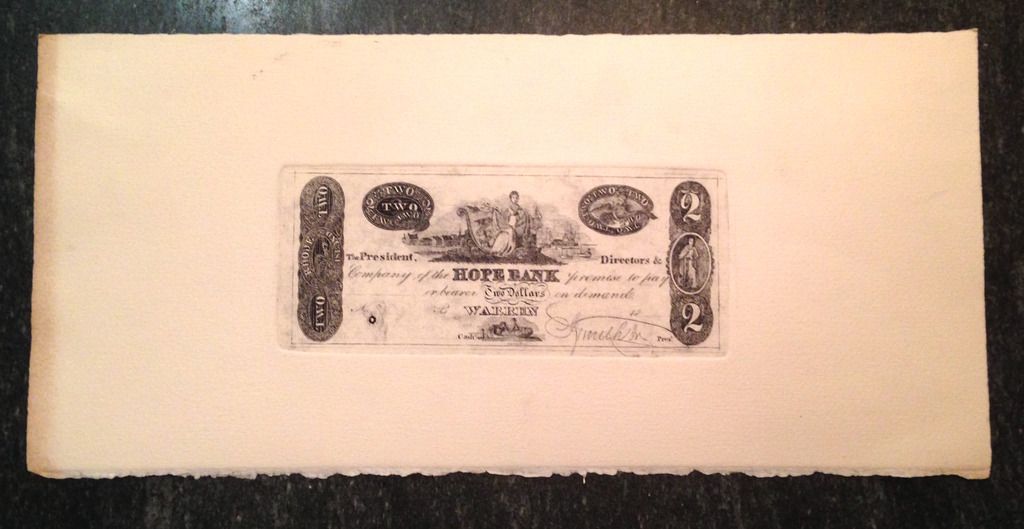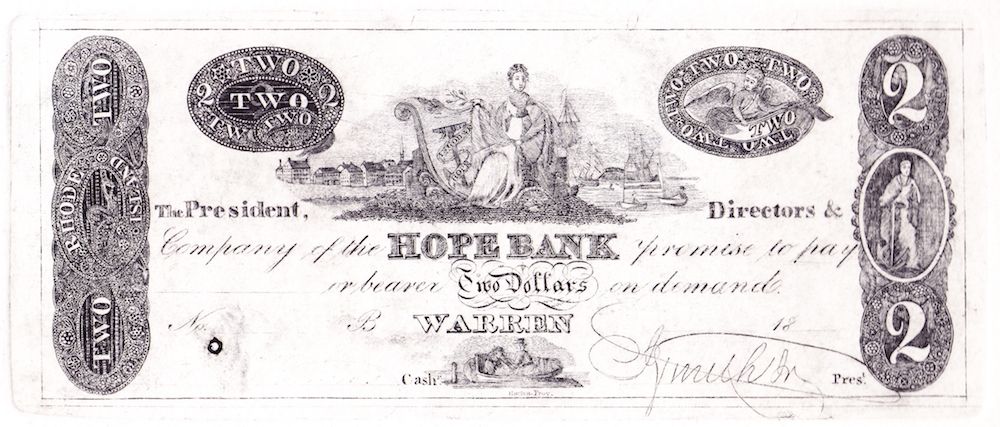How would you classify this obsolete print?
I bought this on eBay recently. It looks to be a print of RI-525 C12, a counterfeit of the Hope Bank’s 1820s $2 note, printed by Horton of Providence.

Haxby lists all genuine issues from this Warren, Rhode Island bank as SENC. Bowers lists all as “none known,” except for a $1 from the 1840s-50s.
The print is on stock paper and measures 7 x 15 inches. The note itself is 3 x 7 1/8, comparable in size to other obsoletes. It has a small amount of toning and smells a bit musty.

The engraved (forged) signature at right is Joseph Smith, president.
My question is: Could this be an impression made from the original counterfeit plate? Or is it more likely a reprint made from one of the existing counterfeits floating around? Has anyone seen this type of obsolete reprint before?
More background on the bank here.

Haxby lists all genuine issues from this Warren, Rhode Island bank as SENC. Bowers lists all as “none known,” except for a $1 from the 1840s-50s.
The print is on stock paper and measures 7 x 15 inches. The note itself is 3 x 7 1/8, comparable in size to other obsoletes. It has a small amount of toning and smells a bit musty.

The engraved (forged) signature at right is Joseph Smith, president.
My question is: Could this be an impression made from the original counterfeit plate? Or is it more likely a reprint made from one of the existing counterfeits floating around? Has anyone seen this type of obsolete reprint before?
More background on the bank here.
My website: RICurrency.com
0
Comments
I have proof examples of fractional counterfeits and this really looks like some of my fractional proofs.
It really could have been done anytime since the early 1800s. I'd guess that it's early to mid 20th century.
I haven't seen this one before, so I'd guess that there weren't many reprints made.
Did you ask the seller if he could tell you anything about it's history?
I was contacted about a year ago by someone who had a counterfeit copper plate for this note. He said he found it in a relative's house in Massachusetts 65 years ago. This print came from a man who has a company that cleans houses in California and his listing noted it came from "an estate" among a collection of lithographs. There are similarities between the print above and the old plate, including little dents and scrapes. It makes me wonder how a 20th century print from that plate could have ended up all the way on the West Coast.
One of my broader questions about this sort of print is, whether anyone else has seen a counterfeit plate before. I've spoken to Bernie about this and he said that many were engraved with the president/cashier signatures and that they were often single note plates, as is the one here.
The owner of the plate didn't want to sell it to me, but I was a little reluctant about buying it as well. I had some questions about its originality, and about whether it could have been made at a later point in time from a counterfeit. The light engraving of the signatures was just one thing that made me wonder, but honestly I'm not an expert on this sort of thing and I could be wrong. As you've mentioned, I've never seen any other reprints of this note but there are a small number of counterfeits floating around. Both Durand and Haxby have them pictured in their books.